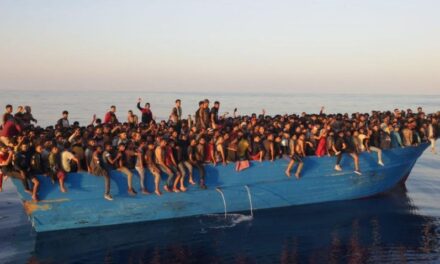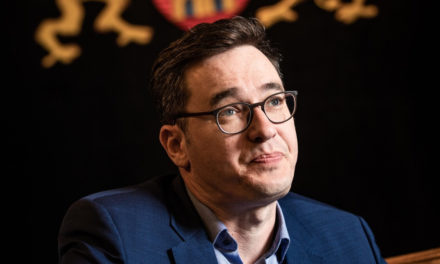It has been a long time since European universities have produced civilian specialists who have an idea of how an army works, how to imagine a joint military operation, or what the escalation ladder is, security policy expert Bálint Somkuti writes about the EU's haste.
It can now be stated that the Russian-Ukrainian conflict, which was racing towards its tragic conclusion from the Ukrainian point of view, has brought profound changes to the world of European security policy. To the environment where the above concept has been missing only "security" for decades.
So much so that in most universities, if "security pol" was taught at all, it became a sub-branch of international relations where they dealt a little more with NATO and less with human rights. But only a little. The vast majority of the education consisted of the presentation of international organizations and rights, and in some places even feminist international relations were invented. Despite my vivid imagination about the latter, I have no idea what it could be.
If you don't believe how much military knowledge has been banished from the field of science, take a look at the specialist books written on the subject after 2013!
Even in the writings and university notes of Hungarian authors, military knowledge was spectacularly relegated to the last place - even though they should cover at least one third of the curriculum, and even the most important part. Civilians do not encounter this anywhere else.
The above is a problem primarily because there have been no civilian specialists from European university benches for a long time who have an idea of how an army works, how to imagine an all-forces operation, or exactly what the escalation ladder is. Because - if they were lucky and got to some formations - from those few visits, they only scratched the surface of their future task. However, without effective civilian control, without a management whose members understand the essence, historical role and characteristics of armed conflicts, there is no well-functioning democratic country and army.
It was important to record the former in order to understand why the European defense industry is probably where it is, almost two years after the outbreak of the Russian-Ukrainian war. Those who expect soaring shares in the wake of the war boom, or spectacular large investments in the case of large European defense industry companies, will be disappointed. Although there are jumps in share prices here and there, the kind of golden age that many expected has not yet arrived at all.
- after February 22
the German leadership sweated out a 100 billion euro development statement (that is, one and a half times the Bundeswehr's 2023 budget), but nothing happened for a long time.
Partly because of this, the defense minister of Europe's largest economy had to be replaced. He then replaced the head responsible for military developments in March 2023, who in return promised in June that two-thirds of the amount would be available by the end of the year. On November 21, the bomb exploded and, following the decision of the German Constitutional Court, a large part of the budget was frozen. Although the ban does not apply to defense purchases already under contract, at the time of writing on December 6, only 3 P-8A Poseidon naval patrol aircraft and a €4 billion missile defense system have been ordered from Israel. The two together do not reach 5, i.e. five percent, of the 100 billion euros.
The French military industry is also struggling with the re-creation of reduced capacities. One of the reasons for this is that the EU, which proclaims its pacifism, did not promote the operation of the European military industry before 2022, either with orders or with the transformation of regulations. Yet already in 2009, the German (!) general leading the preparation of the current NATO strategy described that
diplomacy is supported by military force. In the 15 years since then, the situation has only gotten worse.
Although a hasty and top-down process has just started, the inoperability of the Krauss Maffei Wegmann – Nexter Systems (KMNDS), i.e. French-German merger, created in 2015 shows how deeply a national issue this area is. According to the news, the development of the EMBT, which will be created by combining elements of the next-generation European battle tank, the French Leclerc and the German Leopard 2, is making difficult progress due to conflicting interests and even suspicions of the other party's industrial espionage (!).
Although steps have been taken towards joint military procurement by EU states, this is still far from being realized, and as the difficulties of NATO's similar program show, nation states are quite secretive and rigid when it comes to their security. Although there are forward-looking steps, such as the Sky Shield initiative created primarily due to the Russian-Ukrainian war and mass drone attacks against infrastructure, behind which 19 European countries (including Great Britain) lined up. But this decision was made much more because the EU members had previously reduced their Cold War domestic air defense capabilities one by one.
The Russian campaign against Ukraine's critical infrastructure made the states aware of their serious vulnerability, so the capabilities had to be quickly replaced somehow.
This step is about this clear and present danger, and is not the result of some kind of thoughtful planning.
Of course, as always, there are exceptions. The price of the shares of Rheinmetall, which had made significant investments in Hungary, tripled, and thanks to the company's forward-looking management, they were able to receive the increased order stock due to the war from a favorable position. This jump was made possible by the fact that the decision on the construction of factories representing new production capacities was made years in advance, and by the beginning of 2022, the construction of most of them had already begun.
However, the conditions, which probably greatly contributed to the installation of Rheinmetall's production and even research and development capacities in Hungary, are not available everywhere. As in Europe, the labor shortage in the professions is becoming acute in Hungary, although there is still some reserve.
However, the support of most European governments towards defense spending, which is clearly treated as a stepchild, and the defense industry is practically non-existent. The fact that the European Parliament Research Service's article on the strengthening of the European defense industry received only one comment clearly shows the European attitude to the idea of defense (sic!). And it also accuses the EU of war profiteering and colonialism.
In writing about industry, however, we cannot ignore another vital component of the armed forces, the soldier. Miklós Zrínyi wasn't the only one to sing about weapons and bravery in the Sziget peril. Warriors are just as essential a part of modern armies as they were 360 years ago in the era of the general-poet.
Because what's a horse if it doesn't have a rider? What good is the best saber if there is no one to wield it?
The leadership in Brussels and globalist governments like it have spectacularly no answers to these questions. Who will fight and die for the EU? As long as those who sing folk songs around the campfire are automatically classified as far-right, or anyone who dares to talk about (self) defense is suspect, there is and cannot be any progress. As long as there is no answer to this question, even the above whining attempts are doomed to failure. However, the head of the Polish National Security Office may even be right. If, God forbid, something happens in the US, Russia may indeed try to impose its will on the EU by force of arms. Not decades from now, not sometime in the future, but within a few years. And then what?
Featured image: Facebook/Dr. Bálint Somkuti












